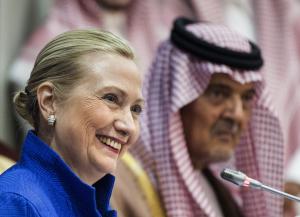
By MAGGIE MICHAEL and RAPHAEL SATTER
CAIRO (AP) — WikiLeaks' publication of more than 60,000 Saudi documents has set pens racing across the Middle East with disclosures about the secretive Arab monarchy's foreign affairs. But lost amid the torrent of revelations are offbeat memos showing the underbelly of Riyadh's diplomacy, including candid accounts of booze runs and pork smuggling.
Among the revelations you may have missed:
FOREIGN DIPLOMATS IN SAUDI ARABIA ARE THIRSTY
It's illegal to drink, sell or possess alcohol in Saudi Arabia, which follows an ultraconservative interpretation of Islamic law, but foreign embassy staffers took advantage of their diplomatic immunity to go on liquor runs to neighboring Bahrain, where the sale of alcohol is legal. Memos published by WikiLeaks describe their unsuccessful attempts to sneak the booze into the kingdom in amusing detail.
On Jan. 18, 2013, Saudi customs officials stopped a Mexican diplomat driving back from Bahrain with "several big suitcases" in his car trunk containing no fewer than 102 bottles of whisky and 48 cans of beer, according to one undated memo. On Feb. 2, 2012 an Azeri diplomat was stopped at customs with 28 bottles of whisky hidden in socks inside his car. That same day, customs officials stopped an Italian diplomat whose car had a taped-up hole cut into the back seat, according to two other Saudi memos.
Diplomats also sought to skirt Islam's prohibition of pork. A March 17, 2012 memo describes a Chinese diplomat's attempt to sneak 30 kilograms (about 65 pounds) of ham into the kingdom in the trunk of his car.
RIYADH KEEPS TABS ON SHIITES
It comes as no surprise
that Sunni Saudi Arabia, which views Shiite Iran as its greatest
regional rival, would take an interest in the spread of Shiite Islam.
But some observations go into a startling level of minutiae.
Saudi diplomats are careful to
estimate, for example, how many Eritrean students are studying abroad in
Iran (40) and the number of Shiite Muslims in Mauritania (50,000). They
were also concerned when a public debate was held between Shiite and
Sunni Muslims near the Philippines' Al-Dahab mosque in Manila. Even
though Shiites make up less than 1 percent of the Muslim population in
the Philippines, a memo dated Feb. 4, 2010 appears to express alarm that
the religious minority's message "managed to get out of its secretive
circle to the public."
"It is
obsessive," said Toby Matthiesen, the author of a book about religious
politics in Gulf Arab states and a research fellow at the University of
Cambridge. "It proves the theory that Saudi foreign policy is at least
in part sectarian and seeks to contain Shiism and not just Iran."
WIKILEAKS PUBLISHED HILLARY RODHAM CLINTON'S PASSPORT DETAILS
WikiLeaks'
trove of Saudi diplomatic documents includes a large amount of
bureaucratic documentation and sensitive personal information, including
sick leave reports, death certificates and hospital records. One
document included in the haul details a 17-year-old's treatment for
life-threatening medical problems. Another is a report describing severe
leg injuries suffered by a 24-year-old at King Khalid Hospital in
northeastern Saudi Arabia. A third describes the proposed treatment for a
child with encephalopathy in the Czech Republic.
Among
the torrent of private information leaked by the website is Hillary
Rodham Clinton's passport number, included in a memo concerning a March
2012 visit to the U.S. Embassy in Riyadh.
WikiLeaks spokesman Kristinn Hrafnsson did not immediately return an email seeking comment on the documents.
RIYADH LIKES LEAKS -- AS LONG AS THEY ARE NOT SAUDI
Saudi
Arabian officials in Washington and Riyadh have refused to respond to
repeated questions from The Associated Press about the diplomatic cables
and official statements urge citizens to ignore the revelations,
warning that sharing the leaked documents could result in imprisonment.
But
a memo addressed to a senior diplomat and dated Jan. 19, 2011 — several
weeks after WikiLeaks rocked Washington with the release of thousands
of U.S. State Department cables — suggests the Saudis sifted through the
American documents and read them too.
"Attached
for your attention is a translated report of the most important leaks
issued by the U.S. Embassy in Riyadh and consulate in Jeddah," the memo
says.
Satter contributed from Istanbul.
No comments:
Post a Comment